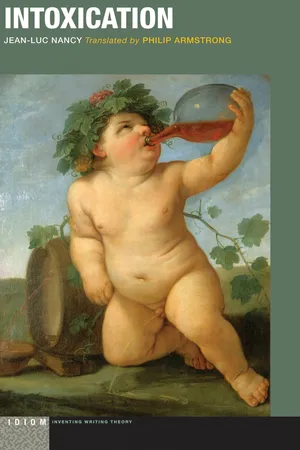![]()
You must be drunk always. That is everything: the only question. Not to feel the horrible burden of Time that crushes your shoulders and bends you earthward, you must be drunk without respite.
But drunk on what? On wine, on poetry, on virtue—take your pick. But be drunk.
(Thus speaks Baudelaire—perhaps we know this only too well—because, in the end, why this commandment as an exergue to modernity? Why do we need this imperative regarding intoxication if not that one perceives that it is lost, forgotten, dried up . . . ? because the “burden of Time” is felt as such, when time could be intoxication’s cadence, the rhythm of impulses and torpor, of pleasures, of extravagance and calm, which make the revival of intoxications attractive . . .)
. . . . . . . . . . . . . . . . . . . . . . . . . . . . . . . .
She will go along an uncertain path,
stumbling method
attempting to take a step backward
toward a more originary illumination,
giddiness of revelation,
or of indistinction between the world and emotion
Sixteen centuries before Baudelaire, Li Bai writes in “Song of the Kingdom of Wei”:
How does one chase away the sorrow that oppresses us?
Wine, wine alone has the power to do this.
. . . . . . . . . . . . . . . . . . . . . . . . . . . . . . . .
At the same moment as Baudelaire, Wagner writes:
In the surging swell
in the resounding echoes
in the universal stream
of the world’s respiration—
to drown one’s sorrows
to sink—
unconscious—
supreme pleasure
. . . . . . . . . . . . . . . . . . . . . . . . . . . . . . . .
When a discourse on intoxication is announced, one might expect either a patient analysis of the specific characteristics of this condition and its significations (enthusiasm, the Dionysian, celebration) or a passionate exaltation of excess, debauchery, distraction, and euphoria. Whether in fear or hope, this is what one expects—either a sober discourse or a drunk discourse. Sobering up or inebriation. We might even think: reason or passion, philosophy or poetry.
However, it is philosophy that says: “the True is thus a Bacchanalian revel in which no member is not drunk,” just as, Hegel adds, the same truth is “transparent and simple repose.” But this relaxation is one of the effects of intoxication; as Hegel also states, “each of the members, in separating themselves [sich absondert] from others, also immediately dissolves [auflöst].”
(Just like Hegel, Schelling also commemorates the bacchanalia of truth, and Hölderlin the aorgic. This is the great, shared memory of the three friends from Stift, the Tübingen Protestant Seminary—this is their mutual baptism in a new age. One hears them inventing cabaret hymns.) All distinction and all separation is abolished, similar to Mallarmé’s lace “in the doubt of the ultimate Game.”
Doubt suspended between distinction and dissolution, between clear figures and mixture, confusion, magma—is it reality or dream, madness or common sense?—doubt suspended in this sense could become a good method: the sly genius would be alcohol, but even though it deceives me as much as it wants, it cannot deny that I am, I who drinks or who believes that I’m drinking, whatever the liqueur. Ego sum, ego existo ebrius—I am, I exist—drunk.
This game of truth is regulated by the way the distinct, determinate, and separate—the individual; consciousness; the knotted, embroidered stitch—loses its difference in the clear tracery of the lace, which is hardly distinguishable from the background [fond] of velvet or silk that it adorns.
This lace, hardly distinguishable, likes to feel itself penetrating this background of felt, of sand or mud. And likes to feel itself penetrated by the individual, the consciousness—which ends up feeling like neither one nor the other but a beast, a demon, melancholy, frenzy.
And so, does philosophy get drunk on poetry? Or is it the opposite? This drinking binge or banquet has taken place since both have existed.
Before, there were trances and the euphoria of sacred liqueurs. However, not every divine service is intoxication; the god needs to position itself indistinguishably between what is drunk and those that drink. The divisions and...

